|
5/15/2023 1 Comment Dan GenselFriendships are funny things. Sometimes, they exist in a fixed place and time, sturdy and strong for a particular period in our lives. A counselor of mine, Jane Estelle, once told me that human relationships are often like cab rides. They have beginnings and ends. That was wise. It's true. Sometimes, though, friendships are a ride that never ends. You don't reach a station and get out of the car. You keep going, through years and locales and jobs and other relationships and seasons of your life. And sometimes they are both. They are fixed in time and endless. Those are the best friendships. Dan Gensel was that kind of friend to me. Dan Gensel is gone. I moved to Kenai, Alaska, in November of 1991. I was 21 years old, and I didn't know anybody there. I'd come from my hometown, North Richland Hills, Texas, and had taken a job as the sports editor at the Peninsula Clarion newspaper. Why? Why not? I was 21 and unencumbered. Alaska was far away. I wanted to go and could go, and that's a combination I wasn't always going to be able to put together. Now, for example. Couldn't do it. Won't do it. Want-to isn't even a factor. Years ago, I wrote a piece for the radio program Reflections West about that time in my life and the factors compelling me to move north. You can listen to it here. My first week in Alaska, I covered a Kenai Central High School-Soldotna High School girls basketball game. It featured two of the best players in the state, two of the best players in the history of the state: Stacia Rustad of Kenai and Molly Tuter of Soldotna. On one sideline was Coach Craig Jung of Kenai, a man I'd come to greatly admire in my brief time there. On the other sideline was Coach Dan Gensel. He and Craig were great friends and ardent competitors. Stacia and Kenai were coming off a state championship; Molly and Soldotna would win one a year later. I didn't know any of that. I was just a new-in-town sportswriter, trying to figure things out. The photo above, of Dan and Melissa Smith, one of the kids I covered that season, isn't from the game in question, but it's a good approximation of the Dan Gensel of my memories. After the game, which Kenai won, he sat in the bleachers with me and just talked. Where you from? How'd you come to this job? What's your background? Getting-to-know-you stuff. I liked him, right from the start. Later, I met his wife, Kathy, and his daughter, Andrea, and liked them, too. In time, it became love. But it was like, from the get-go. Those were lonely days for me, 4,000 miles from home, alone, barely scraping by, driving an on-the-verge Ford Escort and living in a one-room apartment. Dan and Kathy took me out for my 22nd birthday, just a few months later. Dan gave me seats on school buses to far-flung tournaments and let me sleep on his hotel room floor sometimes when that was the difference between my being able to cover something and not. He also gave me a basketball education, one I tucked away, then unveiled when I wrote a short story about a wunderkind basketball player and a coach and a town that loses all sense of proportion. Here's an excerpt from Somebody Has to Lose: “Mendy, it’s like this.” He squared up to the basket, squeezing the ball between his hands and planting a pivot foot. “First option: jump shot.” Into the air he went, releasing the ball at the peak of his jump and watching it backspin softly into the net. Cash, her face red, gathered the ball and rifled it back to him. “Second option: drive.” Paul took two dribbles into the lane and then fell back to his spot on the periphery. “Third option: make the next pass.” He slung the ball to Victoria Ford, directly to his left on the wing. “You know better than to just throw the ball over without even looking.” Paul turned to the players clumped on the sideline. “Shoot, drive, pass. When you get the ball in this offense, that’s the sequence. I don’t want anybody not following it, you got that?” Yes, sir,” the girls answered glumly. "You get the ball. If the defender has collapsed into the middle, you shoot the open shot. If they’re crowding you, drive around them. If you’re covered, make the next pass. This is not difficult. Run it again.” That right there, in just a few paragraphs, is the Dan Gensel philosophy of basketball. It inverts the conventional wisdom of the time—pass first, shoot later—into a kinetic, high-scoring, fun way of playing. And, man, was he ever successful. Won a lot of games. Won a state championship. Made the hall of fame. But that's not what I remember most about him. I remember that he and Kathy and Andrea became family, particularly after I came back to Alaska in 1995 for a three-plus-year stint at the Anchorage Daily News. I remember that I was a regular guest on their downstairs couch, so much so that it developed an imprint of me. I remember that they tolerated movie nights when I'd make them watch Ed Wood and Pulp Fiction, fare that was decidedly not up their alley. I remember later visits in California and Las Vegas. I remember Andrea's wedding in the early aughts down in San Diego, when Dan asked me to give the speech before the father's speech. Predictably, I went for funny and warm, extolling my love for a family and a young woman I'd watched grow up. Dan, after me, had everybody in tears with his love for his little girl. Later, in a quiet moment between us, Dan said, "I knew you'd take them one way and I'd bring them back the other." Teamwork, baby. I remember Dan's closing out the wedding reception by climbing atop a table and lip-synching "Don't Stop Believing." I hate that song, but I love that man. I remember, a few years later, Dan's serving as the best man at my first wedding. The marriage didn't last. The friendship endured. I remember all the times we talked about getting together over the past decade or so. I remember that we didn't make it happen. That'll be the only thing I regret. It's like I said: It's a friendship fixed in time and eternal. I'll carry it now, for however long I'm around. There's been a lot of that these past few years. Too much. 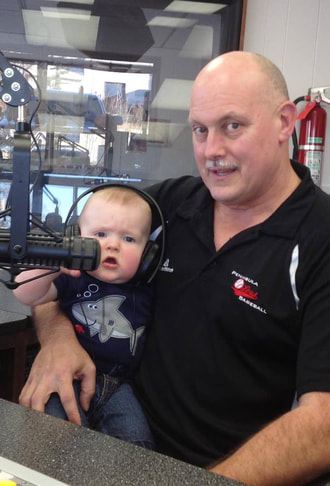 It's been a long while since Dan was a basketball coach. In his final years, he was a sports radio guy--a damned good one—and a grandpa, a role he made his own in an inimitable way. He and Kathy became community stalwarts in Soldotna. Andrea and her husband, Lee, are right there. It's been a good life. It will continue to be a good life, I'm sure, but those who love Dan will have to live with a big hole in it. It's a testament to the community Dan helped me build thirty-odd years ago that one of his former players, someone with whom I've been close since I was a 21-year-old green sportswriter riding a school bus, contacted me with the news. I spent just six months in that job at the Peninsula Clarion. My Facebook page is full of people I knew then and still know now, and I'm a lucky boy, indeed. Dan was 34 when I met him and 66 when he died, and that's both a long time and not nearly enough of it. I'll miss him.
1 Comment
1/15/2023 0 Comments Memory + Imagination = Fiction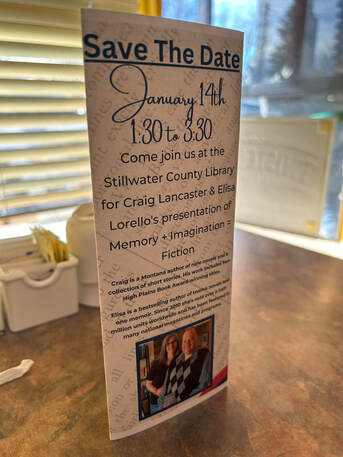 Elisa and I took our new presentation, title above, out for its first spin Saturday at the Stillwater County Library in Columbus, Montana. (Cool side note: The centerpiece pictured here was on our table at Grand Fortune, a Chinese restaurant in Columbus that we hit before the event. I can definitely say that's a career first for me. For Elisa, too.) To say that we were thrilled with the response to our program would be, perhaps, to diminish the meaning of "thrilled." We had a group of about 20 people who dug in with us, asked excellent questions and provided terrific insights, and even gamely took on a writing exercise at the end. The idea was to take The Word—the go-to warmup exercise I've written about from time to time—and apply the principles of memory harvesting to create the short fictional work that resulted. So we had the folks give us a passel of words, then we ran a random-number generator to choose one that would apply to everyone's work. That word: hayloft. Elisa and I wrote along with everyone else. I had the advantage of my laptop, so I was able to write about 630 words in the 20 minutes of the exercise. As I told everybody afterward, if the current manuscript took on words that quickly, I'd be done with it back in November. Of 2020. What follows is my effort ... HayloftMom told me I would be sorry if I didn’t go, if I didn’t see where my grandfather, her father, had grown up. I was dubious, to say the least. I liked our hotel, I liked the pool—the pool was about the only thing that made southwestern Minnesota in summer bearable to me—and I wanted to stay. She insisted that I go. I was nine. Guess who won that debate? The whole way over, our 1978 Chevy Citation baking on the blacktop, Mom told me that she’d only been here once, long, long ago, when she was a little girl, after grandpa had come back from the war in Italy. “It was like a magical place, Jeff,” she said, and I sat there thinking she should see some better magic. “Tractors. Gardens. Corn you can eat off the stalk. A hayloft, Jeff, with a tire swing. You can launch yourself clear into the rafters and come down in a soft landing.” I harumphed. Something good was on TV, and I was missing it. We made a little turn off the two-laner and went down this rutted two-track, between two fields of corn headed for silage. I wasn’t going to be eating anything off these stalks, I figured, but seeing as how I was a civilized boy, I didn’t need anything that didn’t come in a can anyway. But maybe I could slop the hogs and shovel out the chicken coop. Boy, howdy. At the end of the lane stood my grandfather, all unfolded six-foot-six of him, encased like a sausage in denim overalls and a gingham workshirt. I’d never seen him looking like that before; the guy was a navigator for Alaska Airlines, not a goat roper, but I guess it was the same nostalgia trip for him that it was for Mom, making his way to the place where he’d grown up. Beside him, another couple—that’d be great Uncle Leo and great Aunt Darlaine, I supposed, the proprietors now of the farm. I’d never met them, I didn’t think. Mom started crying once they came into view, and I shrank down in the seat, both because they were all waving stupidly at us and because Mom cried a lot that summer, and it had become clear I couldn’t do much other than let her hug my neck. We got out. Grandpa came at us, and Mom collapsed into him, crying at a stronger pitch. He folded her in like the bear of a man he was, and he reached out with a mitt and pulled me in, too. “We’ve been waiting,” he said. “I know,” Mom said, her voice muffled by his overalls. “I don’t think I remembered how far out it is.” Leo and Darlaine, having waited their turn, moved in, too. More hugs. More crying. Pinched cheeks on me, Darlaine’s doing, as she called me a beautiful boy. Torture. Sheer torture. “Jeff,” Grandpa said, holding me at an arm’s length. “What do you have to say for yourself?” “Nothing,” I said. “Well, you’ll need to do better than that.” “Mom says you’ve got corn here I can eat,” I said. “That we do.” “Where?” I asked. “Soon,” he said. “I’ll show you. What do you think of the place?” I cast a look around, for his benefit. All of them—Mom, Grandpa, Leo, Darlaine—had a look like something major would be hinging on my answer. “I’ve seen better,” I said. And then, deflation, right down the line. Grandpa gripped me by the neck, a gesture that looked loving enough but had a little pinch to it. I’d been mouthy. I knew I’d best not be mouthy again. “Well,” he said, “maybe that’s so. But someday you’ll lose a few things, and you’ll know better.” Because part of the exercise involves sharing both the memory and how the imagination was applied to it, here's closing the circle:
The memory: Hayloft was a word that led just about everybody to a farm, in one way or another. A word like that spawns more similarities, even in a large group, than a word like, say, forgettable would. I thought of the farm my grandfather grew up on, which I saw only once, when I was a little boy. I grabbed the name of his younger brother, Leo, and Leo's wife, Darlaine, because it was easier than making up new names. But Leo and Darlaine weren't the proprietors of the farm back then. (That would have been Forrest, another brother, and his wife, Margaret.) Everything else is imagination ... The imagination: Jeff's grandmother is conspicuous by her absence. My grandmother lived until 2017. Jeff's father isn't in the picture. Mine, both of mine, definitely were and are. I can't say I wasn't mouthy, or even that I don't remain mouthy, but I wasn't mouthy like that. I don't remember a hotel. Pretty sure we slept in campground barracks along with the rest of the out-of-town relatives that summer. Soon after that 1979 family reunion, we started losing people, which I'm sure is why it remains so firmly lodged in my mind. And so it goes. Really cool, unexpected, interesting things happen when I do The Word. It's why I love it so. 10/12/2022 0 Comments The Past's PresenceEven though it's been a lively few weeks, Elisa and I have been feeling the pull of something peaceful. We scuttled our anniversary plans at the beginning of the month because Spatz the Cat was ailing, then a calendar filled with wonderful things—the High Plains Book Awards for me, a new novel launch for her—conspired against just-the-two-of-us time. Today, we grabbed a little of that, heading off on a day trip to one of our favorite places anywhere, Chief Plenty Coups State Park. There, less than an hour's drive from Billings, is a place both sacred and accessible to all, a preservation of the great chief's words and artifacts and vision. Every time we go, we take a lunch, then we visit the museum, then we take the long, looping walk around his home and his orchard, basking in the quiet and the peacefulness. A visit truly is a salve. On the drive back home to Billings, just outside the town of Pryor, I stopped for one more picture. You can't see much; the gate at the property was closed and locked, and my little iPhone camera couldn't do much with the scene.
Out there, though, is a house that once belonged to a rancher named Herman Hamilton, who is long dead and even longer not the owner of the spread. And somewhere on that patch of land where the house sits once sat a tiny little trailer home, way back in the early 1960s. It was there that my mother and father lived for a short while as Dad helped Herman tend to his ranch. The time that they lived there far predates me. They've been divorced for nearly 50 years—almost the entirety of my life—and probably haven't been in each other's presence more than a dozen times in all those years. When I'm with them in the same room, it's less a case of the gang is back together and more a case of my looking at them and wondering, "How the hell did this pairing ever happen?" (Answer: Youth and beauty and mutual desire. Move on, Craig.) Anyway, this isn't about that, not so very much. It's not even about this place that sits mere miles from somewhere Elisa and I regularly go. No, this is about the adage that gets fixed to Montana sometimes when it's described as one small town with really long streets. Herman Hamilton, you see, not only was my dad's long-ago employer but also was my best friend Bob's great uncle. Bob, whom I've known only since 2013 or so. Bob, who became friends with my dad because they both owned condominiums in the same development and were chatting one day and Dad mentions Herman Hamilton and Bob says, "Holy crap ..." The world really does shrink sometimes. (Herman was also a bank robber of some repute in the 1930s, but I suppose that's another story for another time.) So, before I go off on a burst of happiness, I should do this: In the interest of consistency and intellectual rigor, I must adhere to my basic sense that happiness, as an emotional state of being, is highly overrated. It's too reliant on current circumstance to be trustworthy, and the factors that spur it—good news, fortuitous coincidences, pure serendipity, and the like—are too transient to be relied upon. My aim in saying this isn't to knock happiness—if you have it, brother or sister, be thankful for it and keep it as long as you're able—so much as it is to cast a vote for its more durable cousin, fulfillment. If you're fulfilled in where you are, whom you're with, what you're doing, where you're headed, you have something to hold tight to when the transience of happiness is with you and when it's against you. That's my theory, anyway. That said, I'm pretty (burbly-happy curse word) happy these days. Let me count the reasons ... 1. One night in Big SkyI'm just back from Big Sky, about three hours from where I live. The board of the Big Sky Community Library chose And It Will Be a Beautiful Life as the community read (One Book Big Sky) for the fall. Tuesday night was sort of the capstone of the event. I drove out, had a wonderful chat with folks who read the book, spent the night, and came home. It was a soul restorer in all the best ways. When writers and writers gather, it can be a lovely thing (see below), but it can also be a release of the pent-up frustration that only writers know and thus are in position to help each other through. When readers and writers gather, it's straight-up love. How lucky was I to spend an evening with a bunch of people who read my book, read it closely, had such interesting things to say about it, and wanted to come talk with me? The luckiest. No doubt about it. I rode those good feelings all the way home. The drive from Big Sky to Bozeman is one of the most visually arresting things you can see anywhere in these United States, so there's that, and believe me, I drank it in (figuratively). I made stops at libraries in Bozeman, Livingston, Big Timber, and Columbus, planting seeds for more days and nights like the one I'd just enjoyed. Here's hoping. 2. The blessings of good friends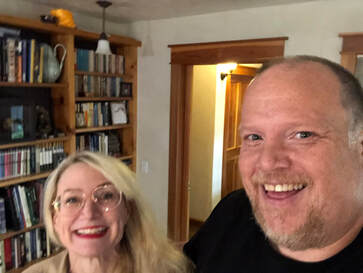 With AMERICAN ZION author Betsy Gaines Quammen. With AMERICAN ZION author Betsy Gaines Quammen. I think I'm only just now getting my considerable arms around how emotionally bereft the pandemic has left me (and so many other people, judging from what I'm reading and what I'm hearing). Honestly, I thought being chased inside and away from gatherings was a small blessing amid a horrible event, but it wasn't that at all. Now that I can see and meet the people I want to see and meet—while still being careful, of course—I'm realizing how much I craved it. Just in these past few weeks, I've gotten to hang in Butte, Missoula (thank you, Gwen Florio and Malcolm Brooks), Livingston (thank you, Amy Zanoni and Maggie Anderson), Bozeman (thank you, Betsy Gaines Quammen and Kryssa Marie Bowman), and Big Sky. I've had the fellowship of brilliant writers and thinkers, genuinely good people, and people who lovingly tend to the cultural life writ large. Man. I've needed that so much. So much. Happy? Yeah, I'm happy. But grateful most of all. 3. The work is going well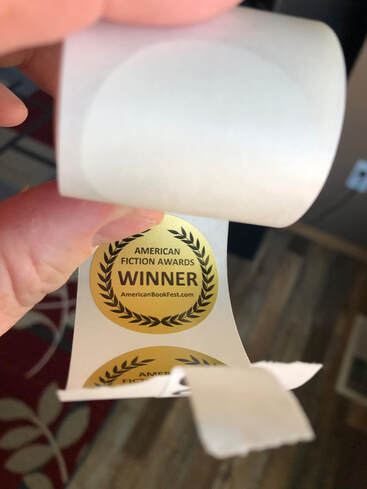 Winning an American Fiction Award was a lovely bit of news to receive. Winning an American Fiction Award was a lovely bit of news to receive. OK, look, here's where I keep it honest: If my publisher had said, sorry, kid, but your manuscript stinks and I'd received a lot of hate mail and my dog was snubbing me, would I be Mr. Happy? I would not. This, of course, underscores my point about fulfillment vs. happiness. I work to a standard I set so I can know I've done my best regardless of what a gatekeeper says (or, at least, so I'll have the gumption to try again if I find the door closed). I try to approach the world with an open heart because I believe that's how we get past at least some of our divisions. I engage with my dog so he knows I'm his, and he's mine. That's fulfillment. The happiness of it comes and goes. But I can't deny that I'm really, really enjoying every side of the work right now: The creation of it, when it's just me and an idea and the challenge of getting from here to there. The production of it, where I interact with the publisher I wanted to be with and who wants my work on his list. The carrying it to readers and interacting with them, which can be such an incredible validation of the work put in. The awards, both realized and potential (talk about transience). I'm as energized for all of it, the whole arc, as I've ever been. In Missoula, while waiting to eat lunch, I happened upon a meeting with a well-regarded poet and fiction writer and a genuinely good human. I don't know him well, but I like him, and even so, in the worst of my do-I-want-this-anymore crisis a few years ago, I deleted him (and a whole lot of other writers) from my social contacts, in a clumsy, flailing attempt at ridding myself of reminders of an endeavor I wasn't sure I wanted anymore. So there I was in Missoula, nonexistent hat in hand, apologizing for something I'm sure he didn't even notice, telling him I was in a dark place. He was kind and compassionate, as I expected he would be. I still appreciate the grace. I hope, the next time I'm on the other side of that conversation, I extend it to someone who needs it. I'd like to think I've learned something. Certainly, I appreciate that the want-to came back to me, and I'm going to nurture it as much as I can. But what happens when rejection arrives (as it surely will), or awards don't (ditto)? I don't know. I'll try to remember now and then and remind myself that I can be in both places. Just not at the same time. 3b. That was a lot. Here's an anecdote.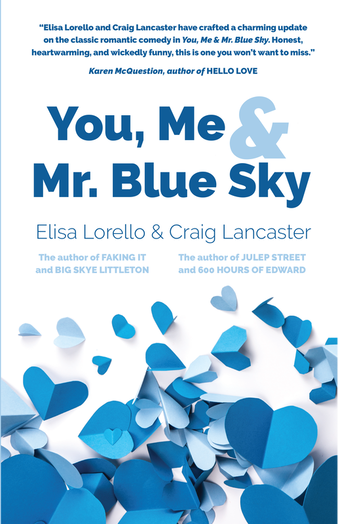 So I'm driving home from Big Sky and I'm talking on the phone—hands-free—with Elisa and I'm saying much of what I said above, only differently, and I'm telling her how energized I am, and I'm hearing how energized she is, and we come around to You, Me & Mr. Blue Sky. It's the novel—a romantic comedy that goes deeper, as Elisa's work does—she and I wrote together in 2018 and 2019. We released it ourselves ... and pretty much let it flop around out there. Our crises of confidence coincided. Those were hard, broken days. We had no energy for much of anything, and certainly not for getting out and trying to introduce a book to the world. We were too adrift in our personal lives to have the fire for the professional. Frankly, there were times I wasn't sure we'd make it. But we did, and we have, and we're going to. Elisa is back, too, and she said, you know what, we should put a new jacket on that old novel we never really got behind. Freshen it up. It's a story of brightness and hope, and it has this dreary cover that doesn't fit it. Let's give it some love. OK, she didn't say that exactly, but that was the gist. And here it is, dressed to meet the readers we hoped it would meet. 4. Health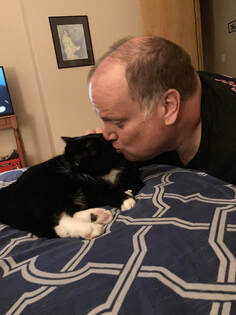 Elisa didn't join me in Big Sky because our cat, Spatz, has been ailing. The most recent health issue was one that had a small sliver of hope for resolution and a rather wide, grim likelihood in terms of what we'd have to do. I had an appointment I had to keep, and Elisa decided to stay behind and tend to our girl. And our girl, not for the first time, has proved resilient. Her issue has resolved itself—or, at the very least, has recessed into a place where she's her old self again for however long that lasts. She was a surprise when she came into our lives, and we've resolved to enjoy her for as long as we have her. That horizon, delightfully, has widened. We're thrilled. As Elisa is given to saying, she's our Rushmore, Max. 8/14/2022 0 Comments Small. Appreciative.
Life has some funny cycles. As I write this, I'm just a handful of hours home from a couple of days in Great Falls, that visit coming on the heels of another Great Falls trip the previous week. Before that, I think the last time I was in Great Falls other than just passing through was ... 2010? 2011? A long time ago. I hope this means I'll be going back sooner rather than later. I like that town.
I was there to take part in a panel discussion of Montana authors, sponsored by the Great Falls Public Library as part of the Big River Ruckus festival. It was a blistering-hot morning, and my planet-sized melon sizzled. As is often the case for literary events, we didn't have a big crowd (I believe the applicable adjectives are "small" and "appreciative"), but we had good times in abundance. I joined poet Dave Caserio (a Billings denizen, like me) and writer Kristen Inbody, and we had a rollicking good time talking about writing in the West, ideas, how place figures into our writing, and much more.
Whenever I do an event, I'm put in mind of a line from a Pernice Brothers song: It doesn't matter if the crowd is thin / we sing to six the way we sing to ten ...
It's a funny line, of course, but the sentiment is dead-on. I've seen everything there is to see at readings, book signings, and the like: small gatherings, no gatherings, full houses, whatever. Whatever you get, you deliver as best you can to whoever was kind enough to show up. It's a charming business in that way. Every hand that's there to shake—or the only hand that's there to shake—is another chance to make a connection. And connections are everything. One person showed up? Great! Take that person out for dinner or a drink. The whole town showed up? Fantastic! Now you've got a party.
Love is love, and we love the stage ...
Before heading home Sunday, I drove out northwest of Great Falls to see the dairy farm my father grew up on. It was only the third time I've been there, and the second was just a drive-by, but I remembered the route just fine. I drove down the long driveway to where the house is, but nobody came out, and I wasn't about to go knocking on doors, so I took a quick look, then slipped out of there quietly.
Here's a nice shot from atop the bench, about a mile and a half from the farmhouse. Sorry for the telephone pole bisecting Square Butte.
When I talk about writing and where it comes from, as I did during our discussion Saturday, I'm apt to talk about how we are born with stories. We're not blank slates. Going to a place that was formative for my father (in mostly devastating ways, unfortunately) is a good demonstration of what I mean. It allows me to put eyes on his life, to process it, and to make sense of my own. Because of the way his life was shaped by his early experiences, he had a story to transfer to me, one that I would start to carry when I came into the world, along with the one I would live out in my own days. The same is true, of course, with my mother, and her parents, and his parents, and their parents before them, and on and on. The stories are inside us, already coded. We draw them out, interpret them, weave them with imagination and memory (in the case of fiction), give them purpose. It's a beautiful thing. Even when the underlying material is made up of mostly terrible things.
"Before you climb the mountain, first the foothills must appear."
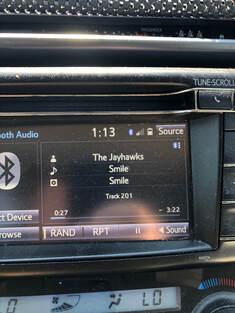
It was a long, hot, empty drive home for Fretless and me. He mostly slept. I mostly sang along with the random shuffle of iTunes, something I can get away with when I'm alone. (I certainly wouldn't subject any human to my singing voice.)
On the final stretch home, I received a particular delight when iTunes served up one of my favorite songs but also one that doesn't often swim to the top of the heap. I suppose most songs remind us of something, someone or some point in time. Certainly, this one does that for me. There's a tinge of melancholy, though, because it's a reminder of a friendship I miss. It's been many years since it went by the wayside, and I've come to embrace something I was told a long time ago when I was seeing a counselor while in the midst of divorce: Some friendships are like cab rides. They have a beginning and an end. Indeed, they do.
Anyway, it was nice to hear the song at that moment, with my head where it was (reeling in other memories), to recall good times with someone who was a good friend, and to put out a silent wish: I hope the good life has found you where you are.
It certainly has found me. Coming home—to Billings, to Elisa, to Spatz the cat—is the best arrival I've ever known. It makes the leaving worthwhile. 8/5/2022 0 Comments Great Falls, AdequatelyCome October 1st, it will be six years of marriage and about seven and a half years of togetherness for Elisa and me, and let me tell you: That's long enough that most of the stories have been told, mine to her and hers to me. We scooted away for an overnight trip to Great Falls this week. I had an event at Cassiopeia Books and an overdue acquaintance to make with owner Millie Whalen, and it was nice that Elisa and I could get away, just the two of us, for a little while. On the trip home, one of those untold stories spilled out ... Great Falls is where a lot of my family lore resides—my father, born in Conrad, grew up around there, and he and my mother married there long before I showed up—but it's not somewhere I often go. In nearly sixteen years of living in Montana, I've been only a handful of times, far less often than I've been to Missoula or Bozeman or Livingston or Helena or, heck, Miles City or Glendive. But in 1992, I almost moved there. That's the story that had gone untold. Now, when I say "almost," some qualifiers are in order. I wanted to move to Great Falls (or thought I did). The sports editor at the Great Falls Tribune at the time, a wonderful guy named George Geise, wanted me to move to Great Falls. The man who could make it happen, a senior-level editor at the paper I'd just as soon not name (but whose name I've never forgotten), made it clear I wouldn't be welcome there. The reason: I didn't have a college degree, and he didn't think I was qualified for the job without one. (I still don't have a sheepskin, but that's another story.) Now, let's be clear: This guy was flat-out wrong. I could handle the job I'd applied for (sports copy editor/page designer). I was handling it at a paper of similar size in Texarkana, Texas, and I would go on to handle it at progressively larger, more prestigious papers. I would, in time, become well-decorated and well-traveled. I would lead workshops in editing. I would direct a large sports department at a large West Coast newspaper. I would ... but I hadn't yet. Not in 1992. Then, I was a 22-year-old kid with some talent and, in fairness to the Executive Who Shall Not Be Named, some cockiness that was a bit out of proportion to the skills I'd honed to that point. And that imbalance, I think, would have been a perfectly valid reason for him to say, "Sorry, kid, not going to happen here." But that's not what he said. He fixated on the degree I didn't have. I didn't get the job. George Geise was disappointed. So was I. There was personal history to unearth in Great Falls, and I was already well in love with Montana, an affair that goes on and on. I thought I was missing out on something important. So, stuck for a while longer at a job in Texarkana I no longer wanted*, I made a resolution, one that has stuck for 30 years: No way was a guy like that going to be right about me. I made sure of it. *—In Texarkana, the single most appalling moment of my journalism career, now more than three decades old, happened. When Magic Johnson rejoined the NBA after his HIV-positive diagnosis, I played the story big on the front page of the sports section (as did just about every paper in America). The next day, a copy of the page was in my mailbox, the story circled in red pen, along with a note from an executive at the paper: "Magic Johnson is an immoral HIV carrier, and none of our readers care about him." I should have quit on the spot. It's to my eternal chagrin that I did not. I did, however, start looking for a new job immediately. 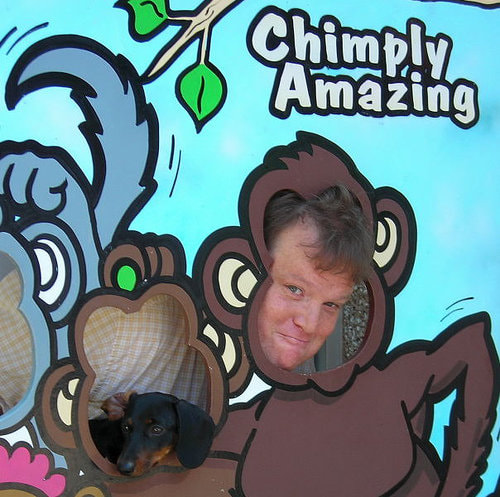 Me with Zula (RIP), clowning around in Great Falls in 2007. Me with Zula (RIP), clowning around in Great Falls in 2007. Now ... Did I miss out on something by not finding my way to Great Falls in 1992? Well, yes. Something. But not everything, and not the most important things. I didn't make it to Montana and stick here until 2006, when I was 36. Within a couple of years, I was writing books, something I'd have not even attempted 14 years earlier. By the time I got here, I'd already dug into the personal history that was faintly compelling me in my early 20s. I'd found my grandfather and closed an open question. I'd begun to talk to my dad about his life and his memories, so I could find ways to get closer to him. In subsequent years, I'd help, in whatever meager way I could, to put ghosts to rest. The headstone pictured below on my grandmother's grave (in Great Falls) went in just 15-plus years ago, well after her death, as my father began to forgive her for the ways she'd wronged him, a thawing of feelings that came about because he and I started digging in the hard soil of his past. On some level, I'm just guessing, but I doubt any of that would have happened the way it did if I'd shown up in Great Falls at the callow age of 22 and burned through that job the way I burned through others during that time in my life. Montana might have been over and done with before I could have gotten to know her. I might have missed the best years I've enjoyed here. The very best years of my life, as it turns out.
So far, anyway. 7/17/2022 0 Comments On the Struggle I just—and when I say just, I mean less than an hour ago—finished constructing and printing out the interior print file for Elisa's forthcoming novel, All of You. I'm proud for so many reasons: that she's written another banger, that she's making tangible progress toward getting it out there, that I am able to use a skill I've developed to help her. Elisa believes in this novel, and she's reached a juncture in her career where putting it out herself and realizing her own vision for it is of paramount importance to her. And that gets at why I'm most proud: A year ago, she wasn't sure she'd ever be here again. Three years ago, I wasn't sure I would be. Much of the joy of writing and publishing and connecting had been sucked out of it, for both of us, for similar and divergent reasons. And, listen, if you can't find the joy, there's not much reason to keep going. The difficulties are too numerous, the frustrations too pitched, the dead ends too abrupt in the best of circumstances. Joy, and its cousins purpose and determination, helps carry you through all of that. I won't speak to how Elisa lost joy and found it again; that's her story to tell in her way. But I can speak to my own journey ... Facebook is a scourge, mostly. But it's also a scourge with features that aren't easily replaceable through other means. I can't call up my nieces and nephews on the daily and ask what's going on their lives—I mean, I could, but they'd quickly tire of it, and I'm just not constituted to operate that way—but I can see every important turn on Facebook. I can be conversant about what they're doing. I can feel connected to them. Similarly, there's nothing quite like Facebook's Memories feature to remind you of the way things once were. Sometimes, it brings into sharp relief just how different your current circumstances are. Elisa and I get this a lot, especially this time of year, which synchs up with the first summer of our courtship—The Magical Summer of 2015, as we like to call it. And so we sit at the breakfast table, older, paunchier, scuffling harder to pay bills, not knowing when or where our next vacation will be, and we sigh contentedly at the memories of a time when royalties were flush, there were no jobs to go to, and we could just disappear without worrying where the next check was coming from. And we say "gee, wouldn't it be nice to experience that again?" and we agree that it would be, but we're not really thinking about how much richer life has become in other ways, lost as we are in the haze of memory. We're not thinking about the house we bought together, the pets we love, the history we're building. We're thinking about being financially carefree and unbound by anything other than our imaginations. They're pretty sweet, those memories ... If you've read the past several paragraphs and thought, OK, great, Craig, but that was a bunch of sentimental claptrap about life and leisure and I'm here for the struggle with art, let me say this: I find it impossible to separate the two. Those memories from 2015 beguile us, in part, because of what fell out from there: Love and marriage and commitment, yes, but also struggle. We both wrote and published books we loved and believed in, same as we had before, only those subsequent books weren't commercially successful in the same way their predecessors had been. We fought against ourselves to recapture what we thought we'd lost, not really having any idea what it was or why it had seemingly gone sour. We got dumped by our publisher, and while it would be nice to be above it, to greet such news with an attitude of "their loss," the simple fact is that the losses felt very much like ours. It felt like rejection, because it was rejection. It hurt because we are humans, and we bleed when we're cut.
However ... It's important to know that, even as you build yourself up as special, you're not. Rejection isn't your burden alone; everybody grapples with it. A change in trajectory isn't singular failure that's on you; that's life and what happens sometimes when you have the audacity to live it. It took a while to come out of that depressive trough. It took a while to find a new footing. It took a while to want to get in there and slug it out again. For me, the breakthrough came when I realized that my happiest place was inside the work, where it was just me and the stories I'm trying to tell, where the measure of progress is keeping faith with what I'm attempting to do by showing up, every day, and doing a little bit more to realize it. When I rediscovered that, the rest began falling in. The publishing partner with whom I want to bring these stories out, who believes in the work the same way I do. The reconnection with a sense of fulfillment (not necessarily happiness, which is more transient and thus, honestly, less valuable to me). Exterior validations of the work. But always, always, it's the work. I see that in Elisa now, the spark she has rediscovered with this new book. She's fully into her own joyousness, and you can take it from someone who's seen this from her before and worried when it went away for a while: Look out. She's got this. 5/25/2022 0 Comments Some Who Shaped Me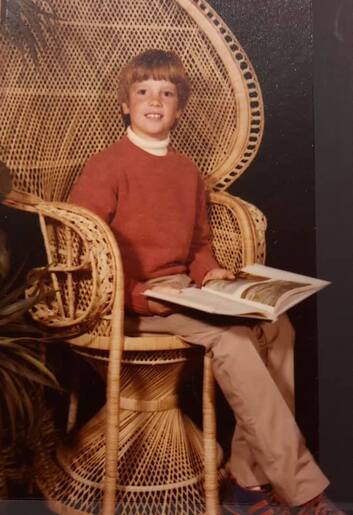 That's not a chair for reading, son. That's not a chair for reading, son. Today's little trip through the memory banks requires us to visit late summer 1978, a suburb of Fort Worth, Texas, called North Richland Hills, a neighborhood (and its elementary school) called Smithfield. Smithfield, in fact, was what most folks who lived there called the place back then. North Richland Hills, now a sprawling burg of about 70,000 people, was a relatively new concern in those days, having been voted into its own municipality 25 years earlier when Richland Hills, the now much smaller adjacent community, declined to annex the area. By 1960, North Richland Hills had gobbled Smithfield, a freestanding community to its north. The census in 1970 put North Richland Hills' population at just a shade more than 16,000 people. We were 30,000 strong by 1980, so you can sort of suss out the math for '78. We were getting bigger britches, for sure, but we were a cozy group. If you were to cleave off the people who thought of Smithfield as Smithfield, because that's what it had always been to them, you'd be left with an even smaller subset. Anyway, it was a different time and, in its way, a different place from what it is now. I was a different boy. There at the left, that's a pretty good approximation of what I'd have looked like (minus the wicker chair) as I pedaled off on a summer day to our neighborhood school, Smithfield Elementary, to see if the classroom assignments for the coming school year had been posted. When I saw that I had been assigned to Charlotte Cooke's classroom, I know I was overjoyed, for that's the teacher I'd been hoping to get as I moved on from second grade to third. So here's the thing: I didn't spend long in Mrs. Cooke's class. Maybe a week. Maybe less. I don't remember, exactly. What I do remember is that a new third-grade teacher started at Smithfield that year, a newly minted graduate who had been a late hire and was getting her first classroom at our school. As I recall, a class was built for her first by asking for volunteers to shift over from their assigned teacher to this new one. After that, the administration would do it by conscription. Again, here's where the finer details are lost to me in the intervening 44—holy shit, 44!—years, but I do remember that I volunteered. I do remember being concerned that if kids didn't act like they wanted to be part of this new teacher's class, she would get discouraged and think she was unwanted. I am certain—utterly certain—that given my affection for Mrs. Cooke, volunteering wasn't what I wanted. I felt like I needed to do it. Where such a notion came from, I have no idea. 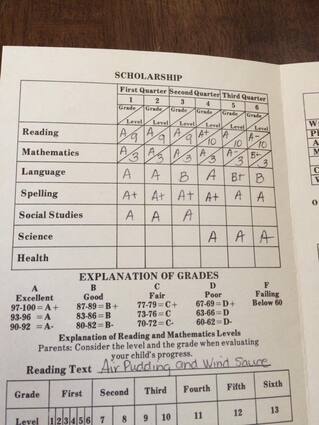 I've made a lot of stupid decisions in my life. Made a lot of fortuitous ones, too, and volunteering for Donna Spurgeon's third-grade class in 1978-79 is a standout in the latter group. I loved her almost from the get-go—I do recall some initial cold feet about leaving Mrs. Cooke's class that my mother told me I'd have to overcome, having made a commitment—and I've loved her straight through. She later had my sister (twice, I think, after she moved up to a fifth-grade classroom), she changed schools and I kept up with her, I visited her classes a few times through the years, I was able to wish her a "well done!" when her retirement came through, and we keep the conversation going on Facebook even today. Back then, in 1978-79, I ended up feeling like I got the best outcome possible. Mrs. Cooke still figured into things, teaching me the perilous math of third grade (fractions!) and breaking me of the annoying habit of making my fours look like nines. But Donna was an all-timer, the kind of teacher I made it a point to keep up with as the seasons changed, for both of us. She started as a teacher (and even raked me pretty hard on my language skills, as evidenced by the report card above), then ended up as a friend. Doesn't get any better than that. So what of Mrs. Cooke. Well ... Sadly, I didn't keep up with her. I liked her, appreciated her, enjoyed her instruction, but time went on and so did I. And so did she. But let's go back to this idea of Smithfield as a place in time and as a heart's memory, just for a second ... There's a dedicated group of people who are from where I'm from, who've stayed, who haven't let the idea of Smithfield get too far away even as its time as a stand-alone town recedes. Every year, first weekend in May, there's a reunion. Living several hundred miles away, as I do and as I have for most of the past 35 years, I've never been to it. That's my failing. This year, I sent a stack of books to be included in a raffle, to hopefully play some small part in keeping these annual get-togethers going. A few days after the event, I got a text message from one of the organizers. She said someone had dropped by, seen the books with my name on them, and remembered me. Charlotte, she wrote. She was Charlotte Cooke, and she's Charlotte Williams now. Well, I'll be damned. A torrent of memory came on. You can see it, in every paragraph above. The organizer, LaDonna Powell, and I launched a conspiracy. We'd send her a book. I'd enclose a card. We'd spring a video chat on her. We'd close this circle that's been hanging open since Jimmy Carter was president. There she is, and there I am, all smiles for our long trip back to each other. I'd like to say I would have known her on sight, on the street, but I probably wouldn't have, and I'm certain she wouldn't have known me. But as we talked—just briefly—I could see the flickers of kindness and care that made her such a wonderful teacher for all those years, one whose classroom I badly wanted to be in when I was 8 years old and rode my bicycle down to the school to see if the luck of the draw had been with me. It had been, and yet I asked to be reassigned, which turned out to be only one of the most consequential decisions of my growing-up years.
Sometimes, it all works out. What I said to Mrs. Williams, in our chat and in the card I included with her book, is between the two of us. In the broad strokes of it, I can say only that I'm grateful. For the kindness of the teachers I've known, whether chosen by me or for me. For the intercession of LaDonna. For the chance to say thank you, and to mean it. Thank you. 4/18/2022 0 Comments Who I Am. What I Do.**—If I'm doing it right, there's both overlap and freestanding territory. For years and years, I didn't do it right. Facebook, I've noted before, isn't good for much, but it's damn near essential for a few things: easy keeping up with far-flung friends and relatives, recipes, irritating others with your daily Wordle grid, cat memes, birthday greetings (the most heartwarming day of the year, every year), etc. Increasingly, I'm finding value in the stored-up daily memories, especially the things I don't remember writing or don't remember the impetus for writing. Today (April 18) served up this kick to the hippocampus: My newspaper career started in October 1988, when Jim Fuquay gave me a job as a part-time correspondent at the Fort Worth Star-Telegram. It ended in August 2013, when I left my job as night city editor at the Billings Gazette. In between, I worked at nine newspapers in six states. Some jobs I took for the adventure (Peninsula Clarion, Kenai, Alaska, age 21). Some I took for money (Dayton Daily News, 1994). I almost always regretted those, by the way. Some I took for escape (Anchorage Daily News, 1995, to get away from Dayton). Some I took because I knew they'd make me better (San Jose Mercury News, 1998). One I took to correct a mistake (San Jose Mercury News, 2000, after bouncing to both San Antonio and Olympia, Wash., earlier that year). Twice I accepted jobs and then backed out before I was due to report (particular apologies to the Lewiston (Maine) Sun Journal). I took different jobs for different reasons. Sometimes those reasons panned out and sometimes they didn't. But most of the time, what I was really looking for in a new job was some new version of me. I never found that. Not once. It feels good to finally admit this. Let's unpack this, shall we? Elisa and I were talking about this the other day, having reached an age at which there's plenty in the rearview to examine and second-guess and (we hope) plenty of road ahead to consider other pathways: If we had it to do again, would we make different career choices? What might we have done instead? Because those ponderings inevitably run up against the butterfly effect, we ended up in a predictable place: Nope. We're good. But it remains an interesting thought experiment, if only for the clarity you find about the choices you did make. I ran toward print journalism—and stayed there a good long time—because it made good use of my particular talents and because it was, in my narrow sense of the word, a daily adventure. Within the strictures of daily newspaper production—you have to gather the stories and stats and pictures, you have to edit the material, you have to design the pages upon which it all rests—were wide variables in what you dealt with daily. The news was always different. The pages began, every day, as blank canvases. I loved that. What I traded for that was significant, though: Friends in other lines of work made more money, enjoyed greater security and stability, had evenings and weekends free, etc. These are not insignificant things. Who I was and my stance with regard to work, especially in my 20s, are so entirely removed from who I am now that I have to strain to remember that guy. I know that his entire definition of self was wound up in being a journalist, that he went to bed thinking about it and woke up each morning with it on his mind, that he bounced up to the world with that shingle around his neck. I lived to work, and I sought out any chance I had to work extra hours, to get plum assignments, to make myself as close to indispensable as I could (an illusion, of course, but one I willingly bought in those years). It's what I didn't do that taunts me now. I didn't fall in love in those years; how could I, when the aggrandizement of Craig the Journalist was front and center among my priorities? I get at that idea in the Facebook memory above: In all my wandering around, looking for some new version of me, I carried my old self into each new situation (wherever you go, there you are). I didn't learn to play the guitar or take a judo class or write a novel. Until, you know, I wrote a novel. When I was trying to emerge from brokenness and impending divorce in 2014-15, I spent a lot of time with a counselor (highly recommended) and with my nose in reading material aimed at my mental/emotional state (e.g., King Warrior Magician Lover) and my soul (The Rag and Bone Shop of the Heart). I wanted to understand what was happening to me, why it had happened, the parts for which I had responsibility (many) and the parts I had to let go (also many). I also read a lot of shorter pieces, some with resonance and some without. Two that stick out, years after the fact, were written by Mark Manson. I recommend these highly, whatever your situation: Fuck Yes or No: "Since you’re now freeing up so much time and energy from people you’re not that into, and people who are not that into you, you now find yourself perpetually in interactions where people’s intentions are clear and enthusiastic. Sweet!" The Guide to Strong Relationship Boundaries: "People with poor boundaries typically come in two flavors: those who take too much responsibility for the emotions/actions of others and those who expect others to take too much responsibility for their own emotions/actions." I hear what you're saying. Craig, you're saying, this is great, but you're talking about personal relationships now, and you were talking about work, and I'm confused. No, no, I'm still talking about work. This is the point. In the extreme emotional duress of a divorce—a traumatic thing I do not recommend, unless, of course, it's the thing that will skirt an even bigger trauma—and with the help of a well-trained, compassionate human and the collected wisdom of learned thinkers, I began to unlock some problems I'd dragged into every area of my life: my interpersonal relationships and my relationship with work. This hard process of dredging up changed me. Better personal boundaries also meant better work boundaries. I'm no less good at what I do—in fact, I'd argue that I'm much, much better than I've ever been—but no longer am I defined entirely by a magazine spread that I've designed, or a report I've edited, or a chapter I've written. What I do is also who I am, but it's not the entirety of the picture. It was written mostly as a joke, but like any good joke, there's truth inside it. In the sidebar on this blog, I define myself this way: Craig Lancaster is an author, an editor, a publication designer, a layabout, a largely frustrated Dallas Mavericks fan, an eater of breakfast, a dreamer of dreams, a husband, a brother, a son, an uncle. And most of all, a man who values a T-shirt. I can live with that. 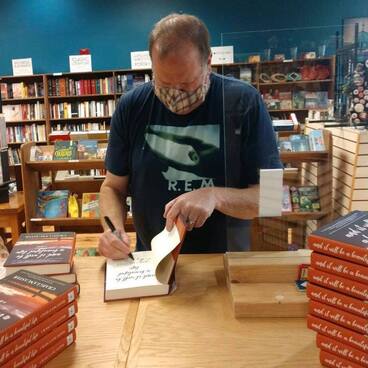 Signing copies at This House of Books in Billings. Signing copies at This House of Books in Billings. In some significant ways, what's happening now in the American workforce—this thing they're calling the Great Resignation—is a manifestation of an assertion of boundaries. We've been through a lot: social tumult, a deadly pandemic, a rebalancing and cross-pollination of work lives and home lives. People are reconsidering what they value, how they want to toil, whom they want to toil for, and what price they're willing to accept for those vast swaths of their finite lives. Good. It's healthy in the long run, even if it's upsetting to the status quo in the shorter term. The last time I moved—packed up my life and my car and my expectations--for a job was more than 20 years ago, when I left Olympia, Wash., to return to San Jose, a place I never should have left in the first place. I can't imagine doing it again, although one of the benefits of growing older is learning that one really shouldn't say never. My point is that although I plan to strap on the work boots for a good long time—I like to work, a fact that was clear even 30 years ago, if badly applied--where I am and who I am and how I'll share those parts of me need more than just a job. I need a multidimensional identity, too, and at last I have one. That's what I was missing in all those moves cited in the Facebook post above. The last time I recast how I define myself professionally occurred when I wrote and published that first book and I figured I could finally call myself a novelist instead of just a guy who wished he had one inside him that he could extract. That was nice, too, but it's not everything. Without the laying about and eating breakfast and doting on my nieces and nephews and being a son and a brother and worrying about the Dallas Mavericks and spinning through this life with my wife, in fact, it wouldn't mean much at all. 4/7/2022 0 Comments How Do We Feel About Poetry?
Love it! What's the next question?
No, seriously, the great Chris La Tray asks some provocative questions and ponders the meaning of National Poetry Month (which we're now in) in his latest Substack piece. Quoting Chris: This might be the wrong place to ask this question since you glorious subscribers are obviously anything but ignorant philistines in such matters1, but is poetry really an “important place” in the lives of many people? The running joke when it comes to poets is they are the purist practitioners of literature because they obviously aren’t in it for the money. Which sucks when you think about it. So I have to wonder: how many people really engage with poetry on a regular basis? How many people actually buy it? The stuff that goes on around National Poetry Month is worthwhile, I just wish it wasn’t relegated to one month. April rolls around and people get all performative with their love of poetry, share links to poems published online or whatever, but where does it go from there? I encounter many people who tell me, “I don’t get poetry.” That’s fair. I didn’t “get” it for a long time either. When poetry had a bag dropped over its head and was rolled in a carpet and hauled off to the ivory towers to be enjoyed by only a stuffy few the connection to its roots was severed. I contend, though, that there is poetry for everyone. Everyone. I'd like to just endorse all of the above, if I may.
I, too, have heard the "I don't get poetry" bit, and I've probably even said it, although I will say, in my defense, that I was young and inexperienced and kind of ignorant. What I often say, now, when I hear that is, "Well, you listen to music, don't you?" That's poetry, man. And it doesn't have to be Patti Smith or Michael Stipe or Nico—but it should, it should be all of them and many, many, many more. Find the writers and the voices that not only speak to you but also impart something you're not going to find in whatever bubble you live in. Find the words of those who live other lives, have had other experiences, see the world with eyes different than your own. Find something that smacks you in the head with a ratchet. Something that moves you. Once you've got that, everything else is just a matter of form, be it song or sonnet or haiku or slam or whatever.
By inclination and profession, I go to a lot of literary readings, and given a blind choice—go listen to an unidentified poet or an unidentified writer of prose—I'm going to see the poet a hundred times out of a hundred. For the sheer chance of having your doors blown off, of being wowed by the substance and the sonic gelatin that holds it all together, nothing beats a poetry reading. Seriously, listen to Robert Wrigley here and tell me you don't want more. Tell me you don't want all of it.
One of the luckiest things about living where I do is that the place is thick with great poets. Great poets. Just the other day, we attended a reading by Tami Haaland, former Montana poet laureate (and our friend), and Elisa said it was "exactly what my heart, mind, and soul needed today." Yeah. Mine, too.
My brother-in-law, a well-regarded musician and recording engineer, in answer to a question of mine about what makes him sit up and say "holy (very bad word)" when he hears a voice, said this: "The emotion the musician channels." So it is with poetry. That's the beauty. We needn't confine it to a month in spring. We need it every damn day. Go get some at your local indie bookstore. Or use mine. |
About CraigCraig Lancaster is an author, an editor, a publication designer, a layabout, a largely frustrated Dallas Mavericks fan, an eater of breakfast, a dreamer of dreams, a husband, a brother, a son, an uncle. And most of all, a man who values a T-shirt. Archives
April 2024
By categoryAll 600 Hours Of Edward And It Will Be A Beautiful Life Awards Books Bookstores Community Connection Craft Craig Reads The Classics Dreaming Northward Education Edward Adrift Family Geography History Libraries Memory Montana NaNoWriMo Northward Dreams People Plays Poetry Public Policy Q&A Social Media Sports Stage Texas The Fallow Season Of Hugo Hunter The Summer Son This Is What I Want Time Travel Work Writers Writing Archives
April 2024
|
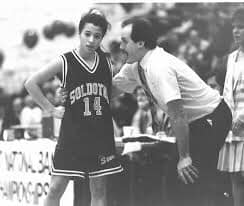
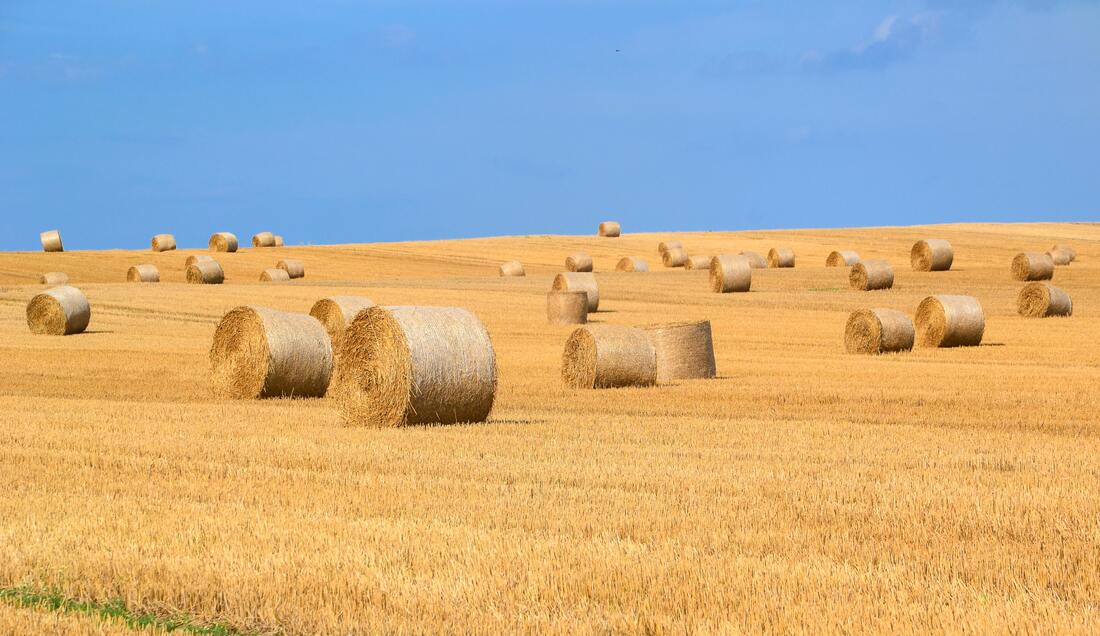
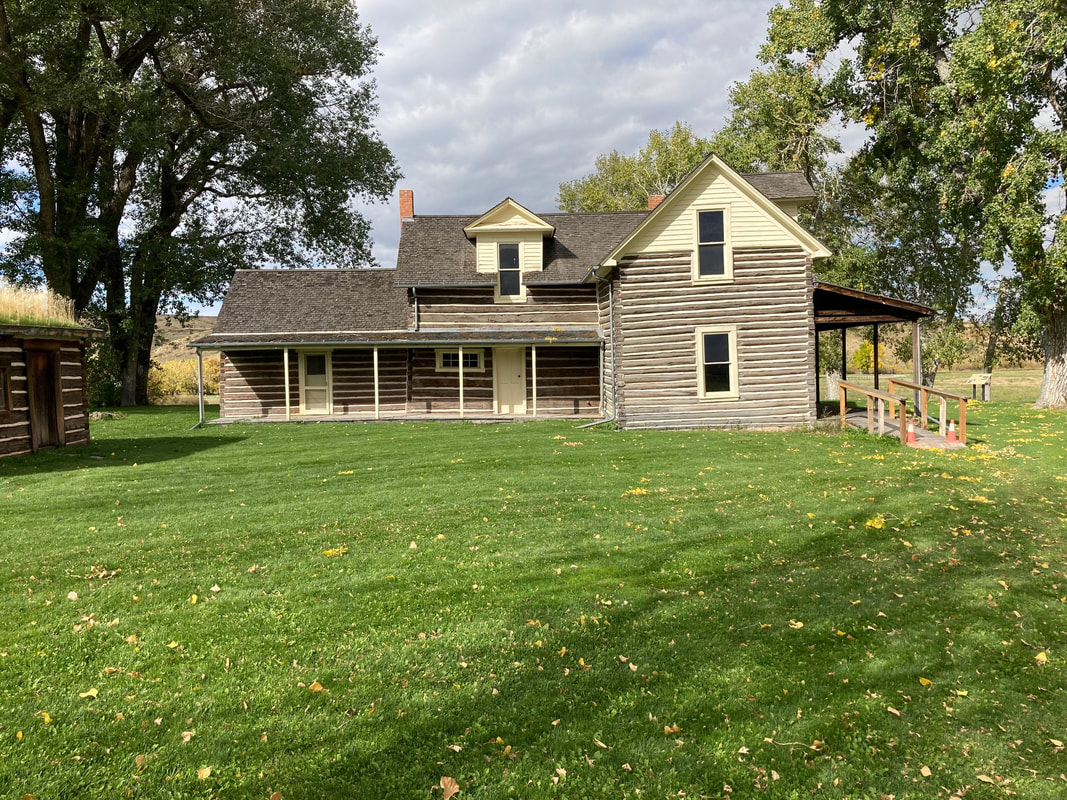
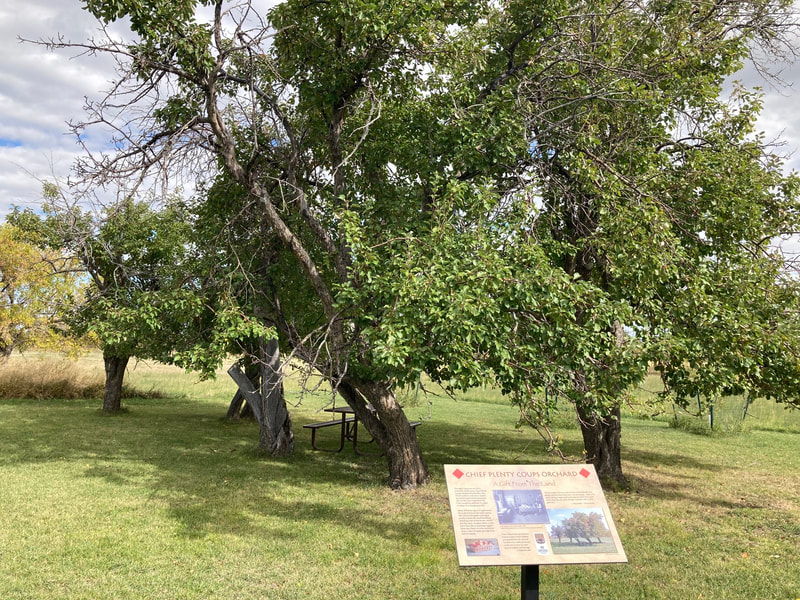
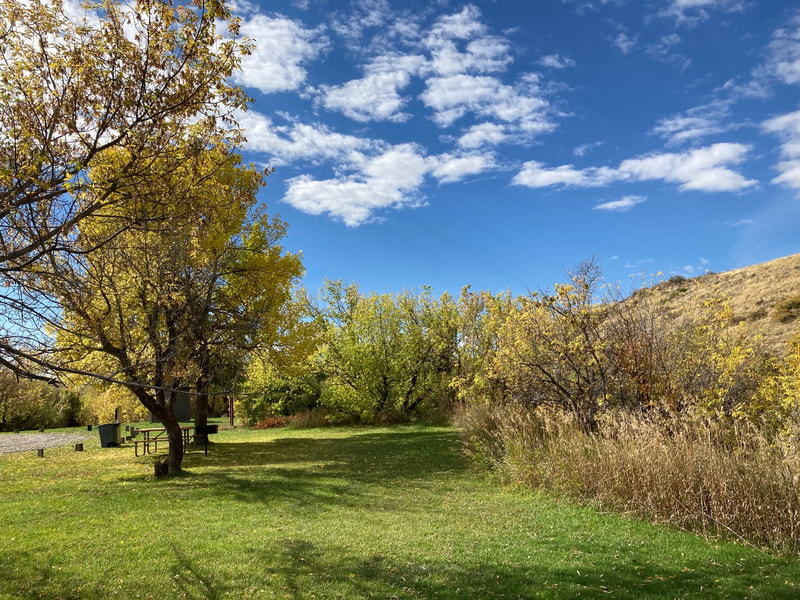
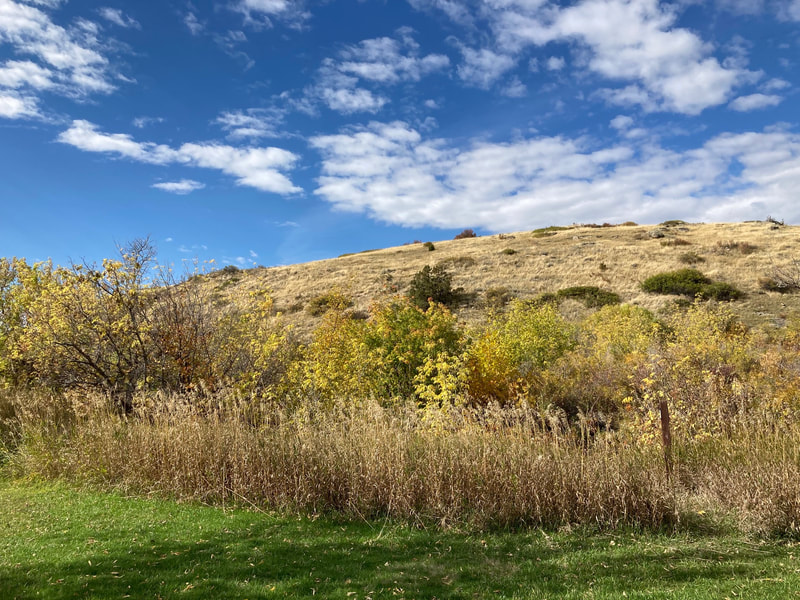
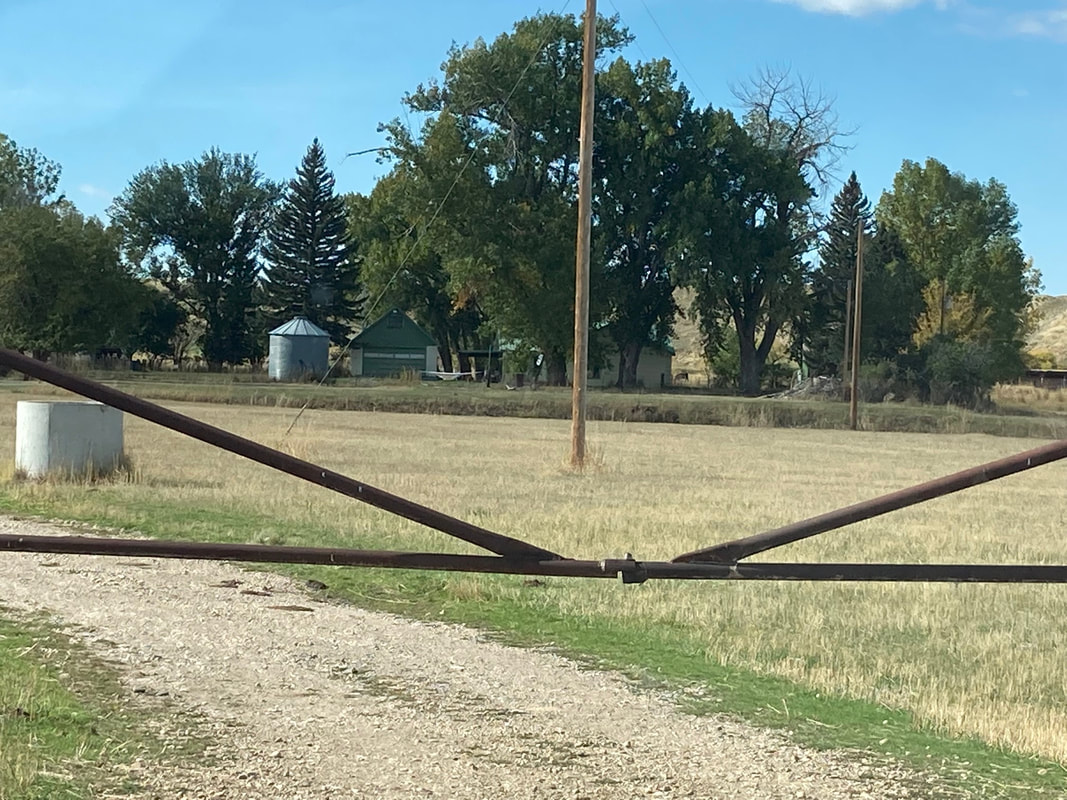
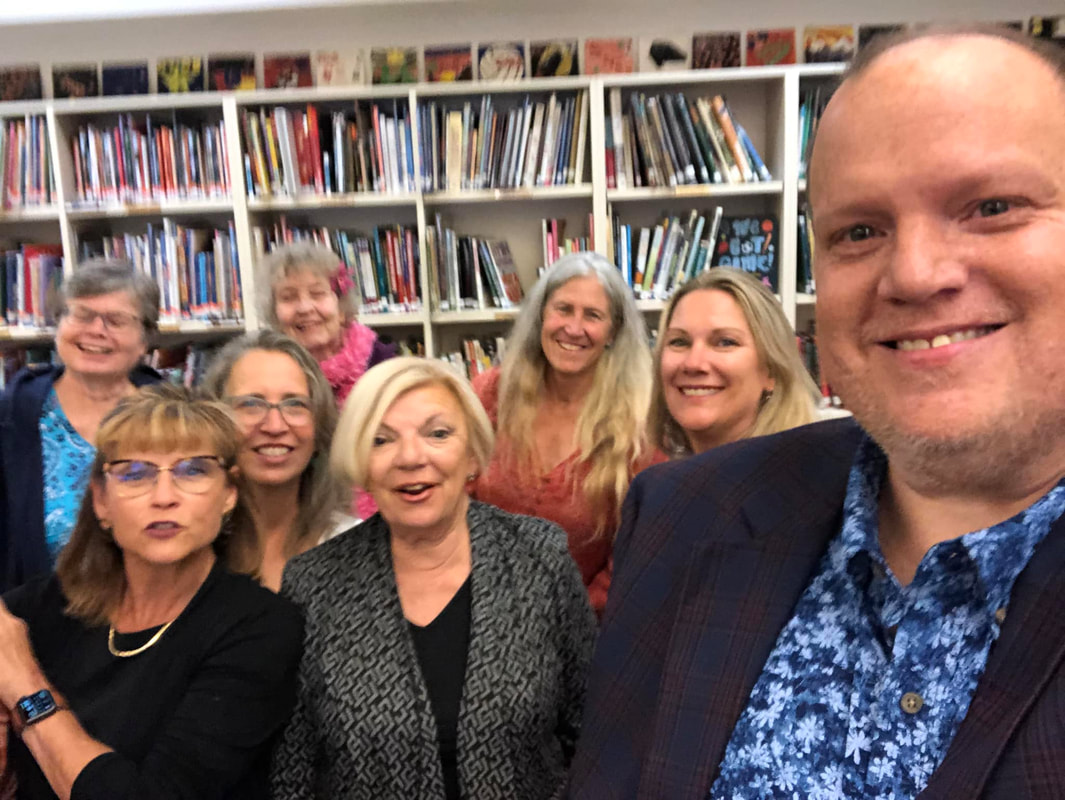
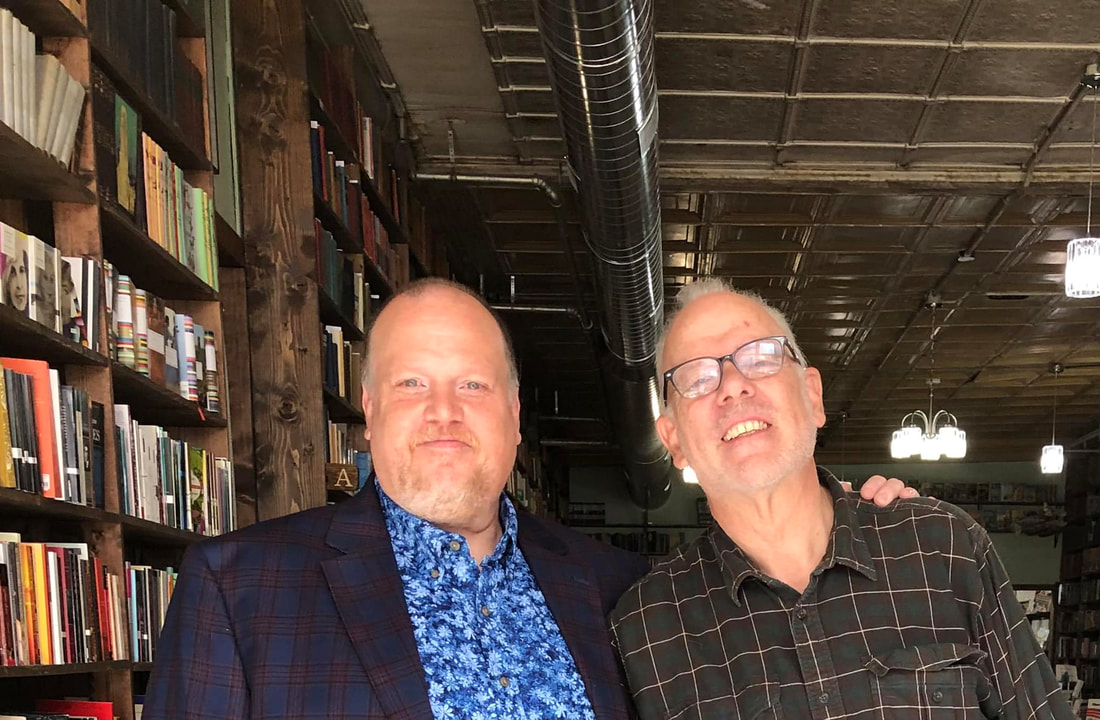
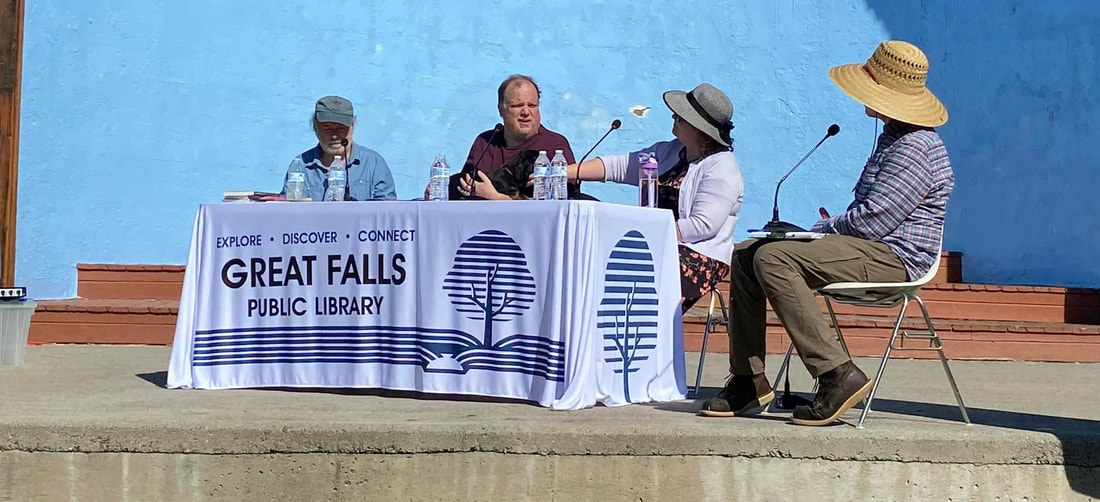
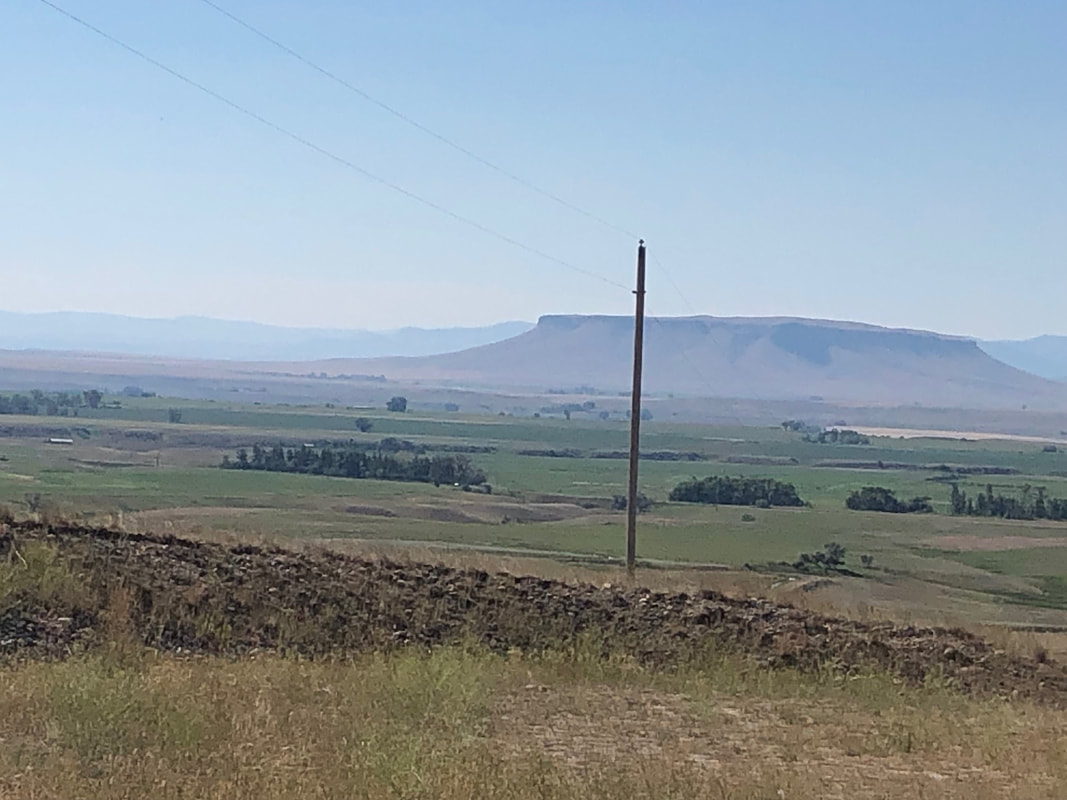
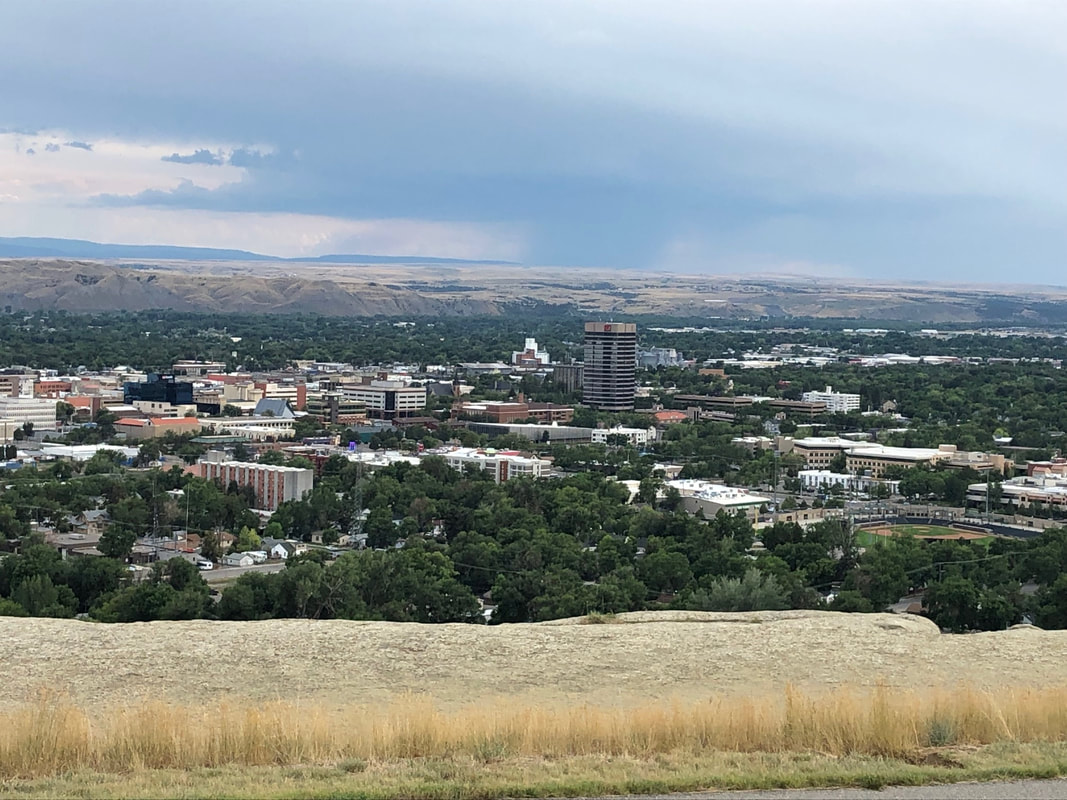
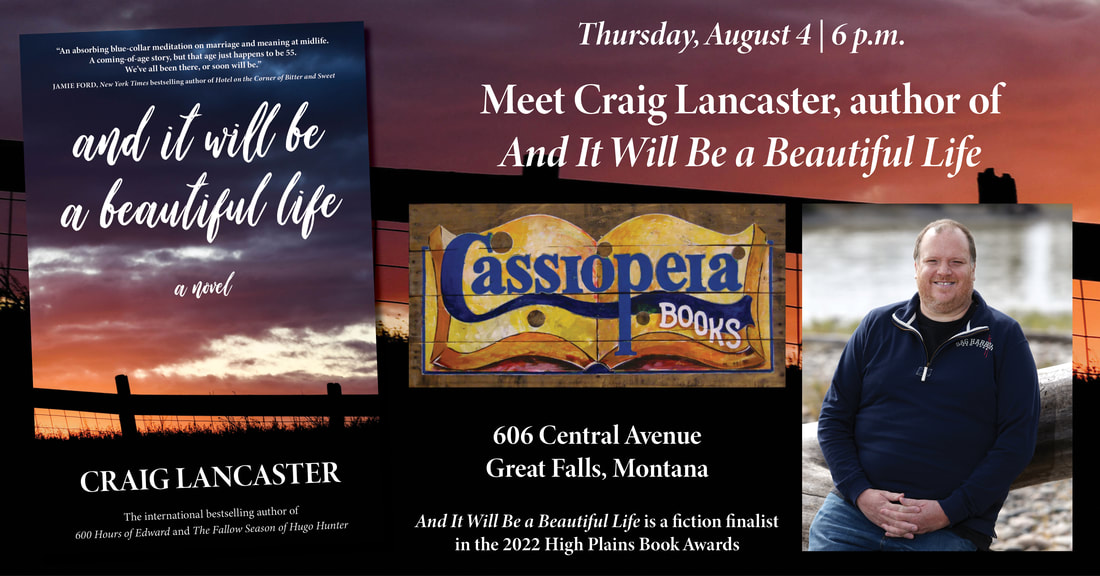
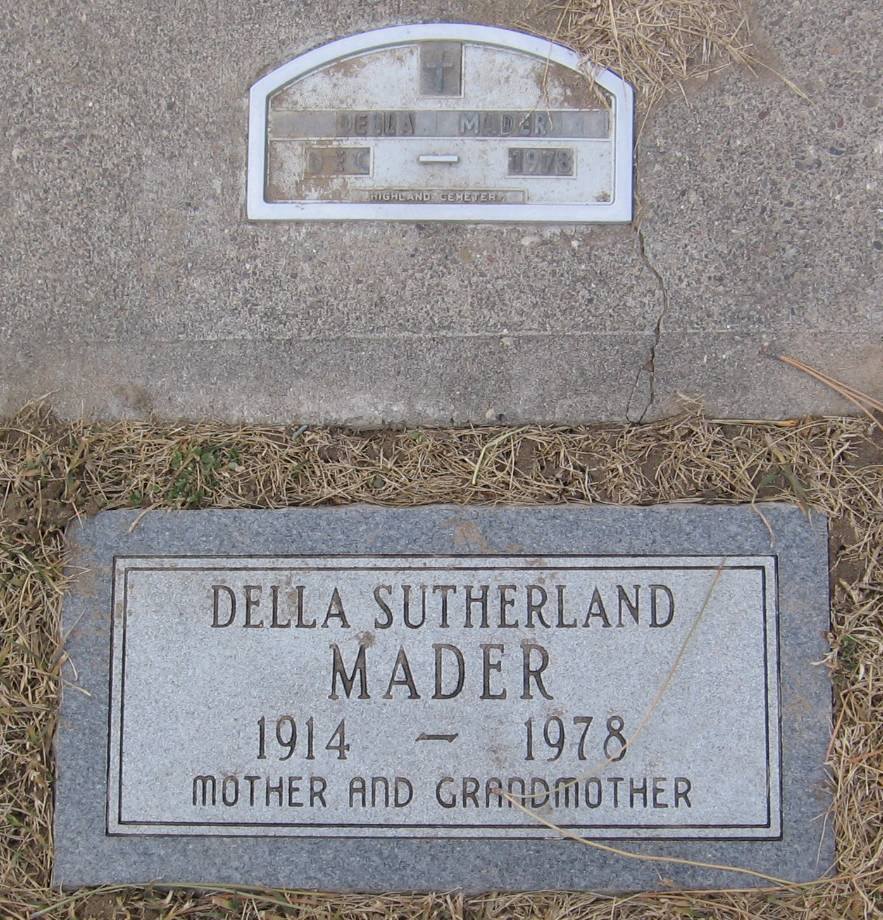
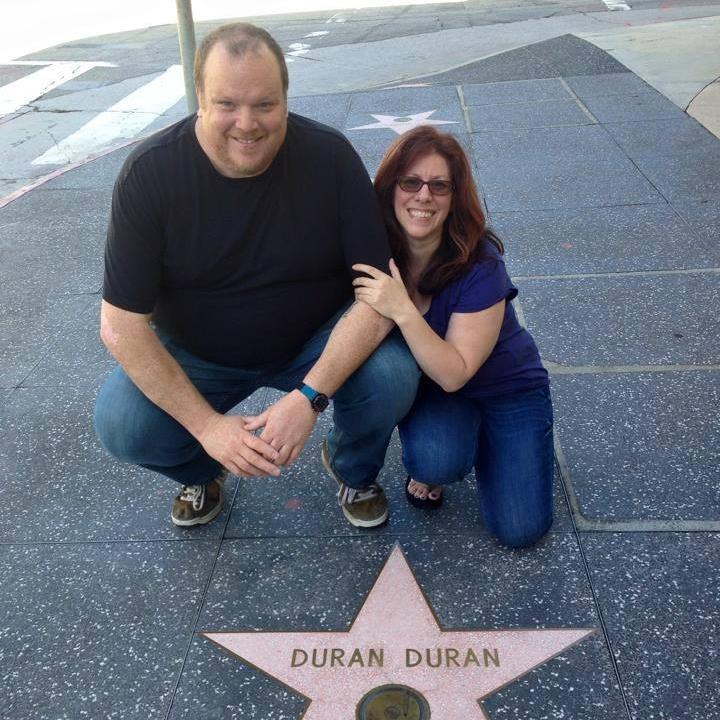
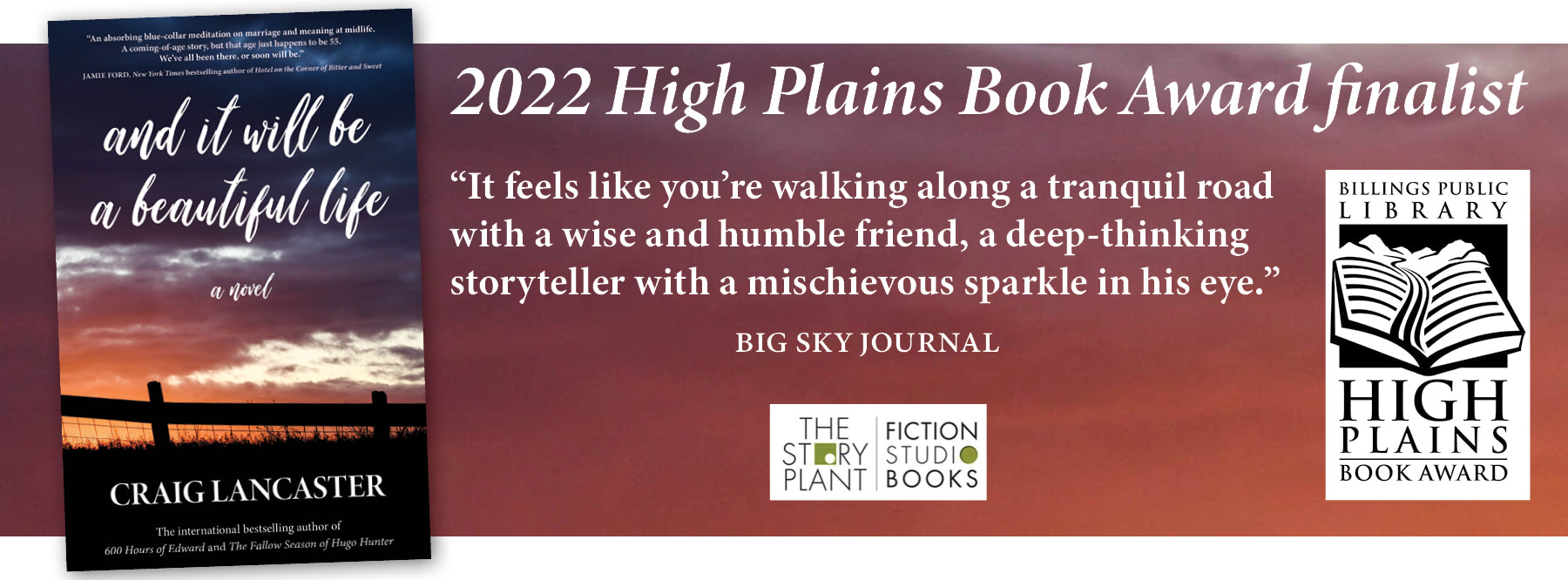
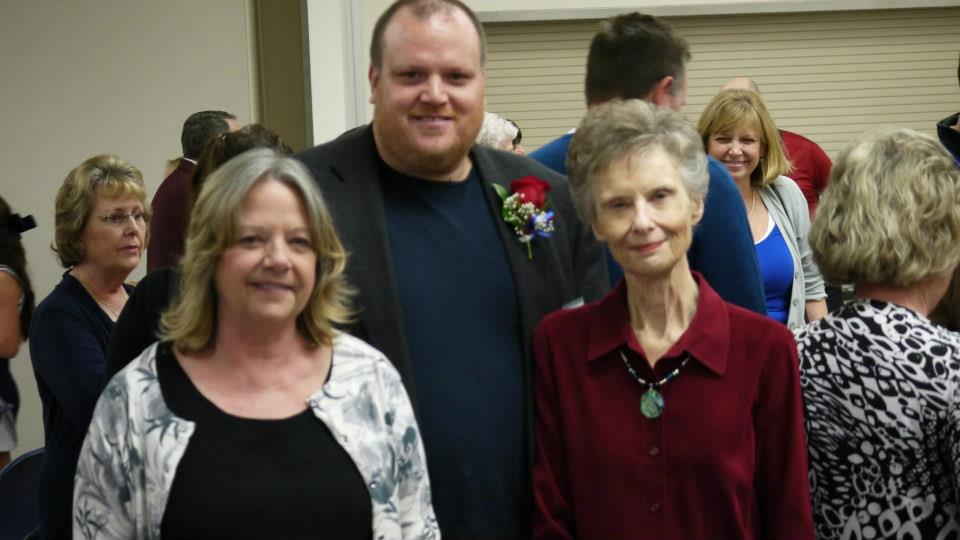
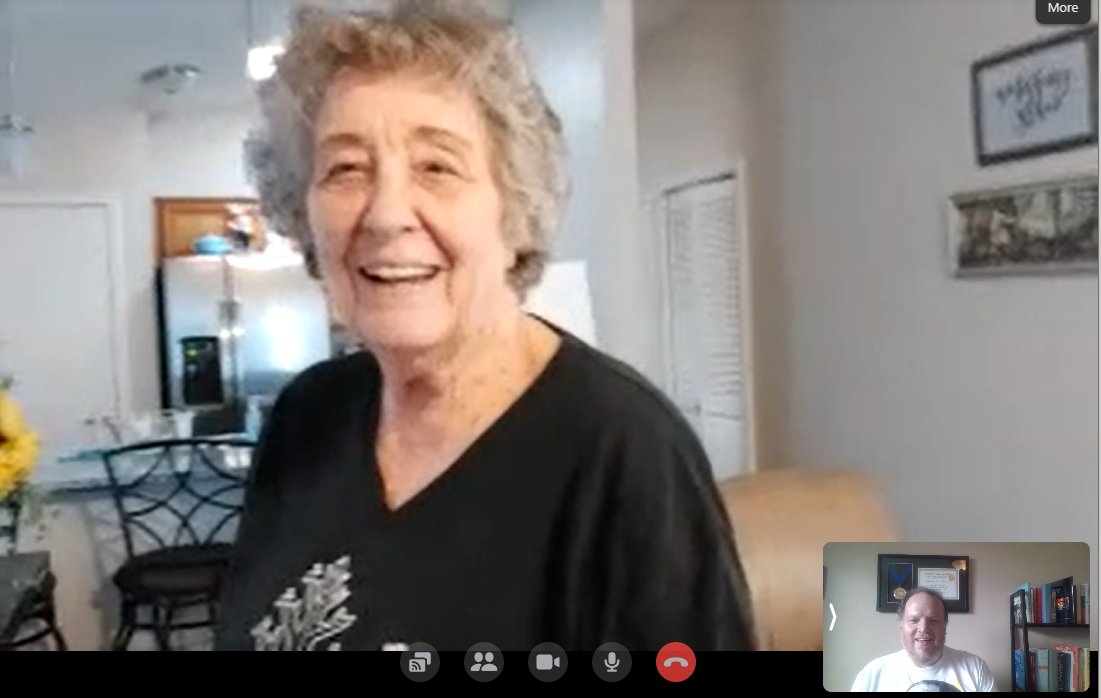
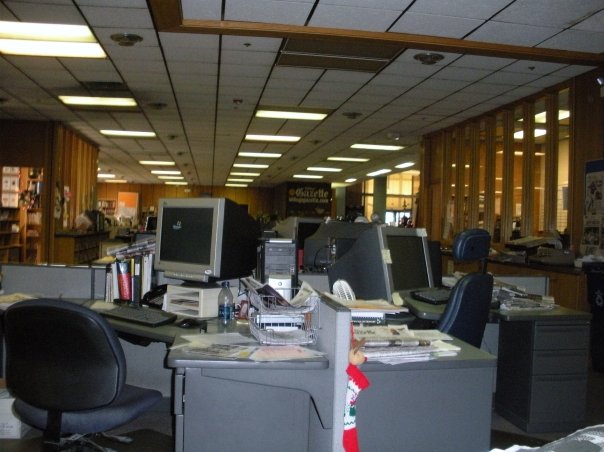
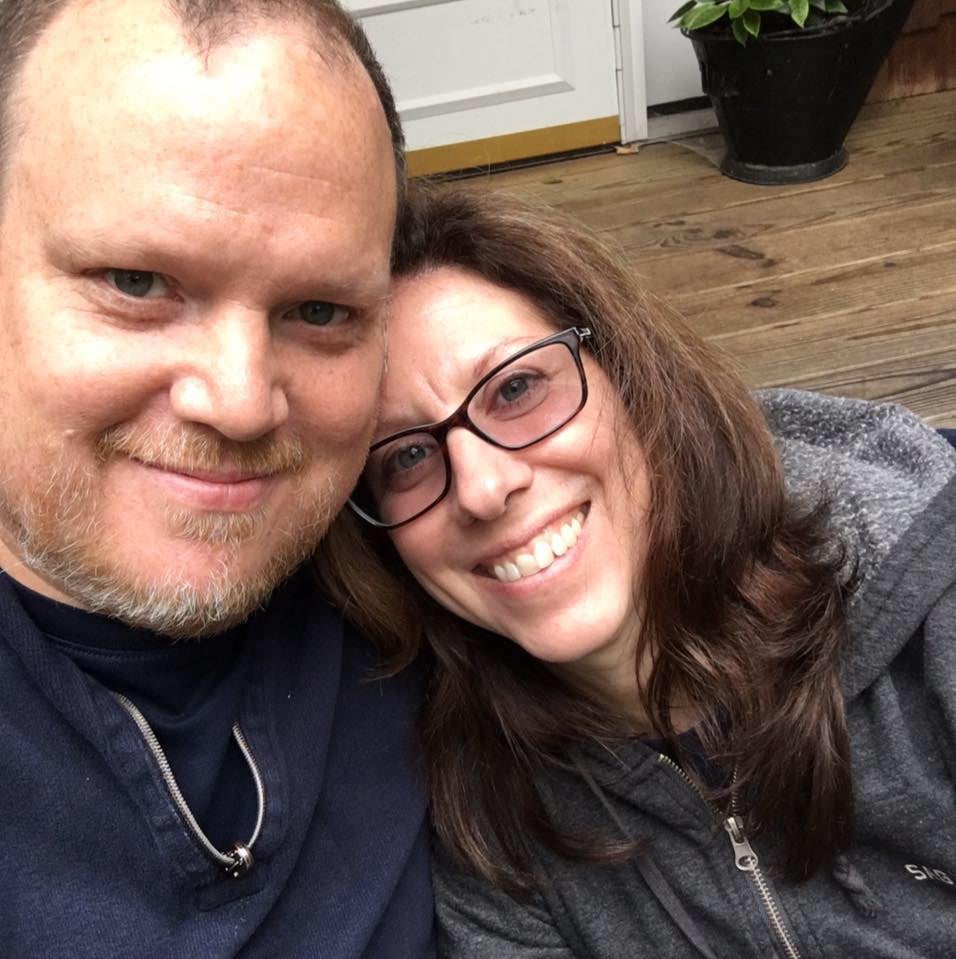

 RSS Feed
RSS Feed